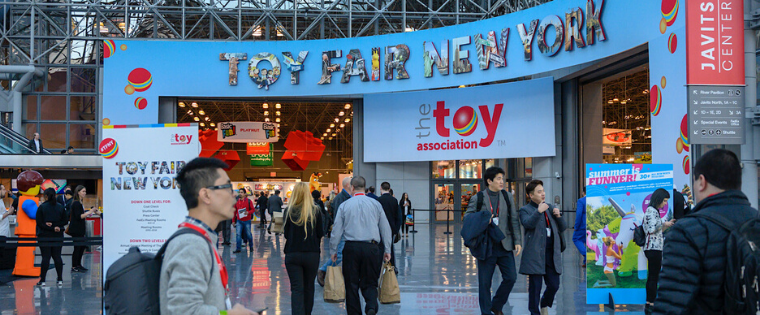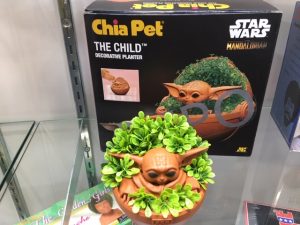NY Toy Fair: Streamers, Influencers and Digital Properties Lead the Way

Toymakers are looking to a mix of evergreen properties and a broad selection of IP based on streaming platforms, YouTube channels and influencers and videogames to drive their license-based sales, manufacturers told us at Toy Fair New York.
In the days before Toy Fair, Disney grabbed attention by unveiling a slew of “Baby Yoda” products, Hasbro gave financial analysts and media a look at its plans for eOne, and Mattel talked up its increasingly robust content development plans.
While an assortment of major films will hit theaters and store shelves throughout 2020, there’s a general expectation they won’t reach the product sales levels of last year’s big theatrical releases. So many toymakers are placing their bets on properties from other platforms with intense fan followings such as Netflix’s “Umbrella Academy” (Just Play and Funko), Amazon Studios’ “The Boys” (Jazwares) and the “Subway Surfers” mobile game (Alpha Group).
Evergreen Growth
Other companies are taking shelter under evergreens. For example, NECA, which traditionally has relied on nostalgic horror properties for its figures, is expanding its acquired line of Clapper (Clap on! Clap Off!) and Chia Pet products with licenses, such as a Bob Ross-licensed Chia Pet and a Clapper connected to A Christmas Story, along with another bearing “The Child.”

“It is kind of a brave new world; it is not just the key theatricals or television content anymore” that are fodder for licensed toys “because videogames, streaming services and YouTube channels and influencers” are increasingly grabbing kids’ attention, says Matthew Sherman of Alpha Group, which is readying a line of two- and four-inch Subway Surfer figures that will be exclusive to Walmart for a year starting in August. It will add RC vehicles in 2021. “In one regard it’s a new opportunity, but it is a lot more competitive with more challenges because the retail footprint isn’t as big any more. You are literally fighting for every foot of shelf space.”
In general, streaming services are still reluctant (if not totally unwilling) to share viewership data, which makes it difficult for potential licensees to evaluate the opportunity. Plus, for the streamers who “drop” entire seasons of shows into the market at one time, it’s difficult for manufacturers and merchants to stockpile product and anticipate consumer engagement and product demand.
On the other hand, classic TV series such as “Friends” and “The Office” that are among the most-watched shows on those platforms have been consistent generators of product sales far beyond what would have been expected without that continual exposure.
Also at Toy Fair:
- Even as Hasbro announced plans to make toys for shows such as Peppa Pig, PJ Masks and Ricky Zoom it gained via the eOne acquisition, those properties’ current licensees such as Jazwares (Peppa Pig), Just Play (PJ Masks) and Tomy (Ricky Zoom), all mounted major displays of new product. “It’s been business as usual,” says Jimmy Chang, Senior Marketing Director at Just Play, whose company was introducing a new playset for PJ Masks.
- Mattel’s decision to bring plush inhouse rather than licensing its IP out for the category was prompted “by us seeing a lot of opportunity left on the table” and “this gives better control of a category that will be key for us moving forward,” a Mattel spokesman said. Meanwhile, Mattel, which fielded Toy Story 4 products last year, has extended its license with Disney to include all of Pixar’s films including Monster’s Inc., Cars and others, the Mattel spokesman said. Mattel also is readying the first International Olympic Committee-(IOC) licensed toy collection that stretches across the Barbie, Hot Wheels and Uno playing card lines. While Mattel has fielded “Team USA” Barbies since the 1976 Olympics, the new line marks the first time for a broader IOC-licensed line. The Barbies are designed around the five sports being added to the Olympics this year: softball, surfing, rock climbing, skateboarding and karate.
- Sustainability was a theme in many booths at Javits. Mattel introduced two Fisher-Price products and three Mega Bloks building sets made from sugarcane-based material, as a step toward its previously-stated goal of having all its products and packaging made from recycled, recyclable or bio-based plastics materials by 2030 Meanwhile, MGA Entertainment, building on its work with recycling company TerraCycle, launched the biodegradable Little Tikes “Go Green” ride-on line that’s made from recycled resin. MGA is targeting having all of its product be biodegradable by 2025. It has a recycling program with TerraCycle for L.O.L. Surprise packaging, and will shift the brand’s accessory bag to paper later this year. L.O.L. Surprise packaging will be biodegradable by next year.
- New dual-branding strategies. McFarlane Toys introduced a seven-inch Spawn/Mortal Kombat action figures with game publisher Warner Bros. Interactive Entertainment. Warner Bros. will collect royalties on sales of the action figures, while McFarlane gets them when the Spawn figure is bought as an in-game purchase within the “Mortal Kombat 11” mobile game.
- Meanwhile, Just Play expanded the number of licenses it’s applying to its Hairdorable products, adding to a line that started with JoJo Siwa last year. New versions are based on Minions, Hello Kitty and Trolls.
- The calming influence of toys? Spin Master’s Cardinal Industries is introducing a series of 60-400-piece “Relaxation,” “Serenity” and “Balance” puzzles under the brand of meditation firm Calm. (founded in 2013 by Michael Acton Smith, who also founded Mind Candy, known for its Moshi Monsters online world).
- Licensed collectible power Funko wants its non-licensed toy business to account for 20% of revenue over the next several years. It unveiled Snapsies, toys that are dispensed through a touchscreen-equipped vending machine that allows the user to customize its various characters. The machine continually displays short videos supporting the characters produced by Funko Animation Studios. Funko leases space for the machines at retail stores. Funko also installed the vending machines at GameStop and ThinkGeek stores for its new Paka Paka capsule collectibles. It has no immediate plans to license out the brands, but is continuing to pursue deals for its Wetmore Forest label, CEO Brian Mariotti said. Meanwhile, the company is expanding the board game business it acquired when it bought Forest-Pruzan Creative a year ago, adding licenses for PanAm, Back to the Future and Godzilla. The expanded assortment of games and owned IP are part of Funko’s plans to double sales to $2 billion within 5-7 years, says Mariotti.




